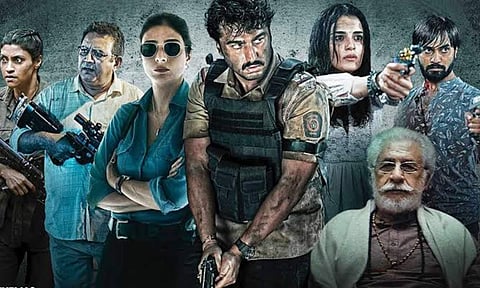Kuttey Film Review: An amateurish caper with an undeserving cast
Rating:(2 / 5)
Kuttey begins as a happy jolt of Vishal Bhardwaj. The word ‘Azaadi’ makes a dignified comeback to Hindi film lyrics. We hear it in Sukhwinder’s piquant, inimitable voice. We also see Naxals take out a remote police outpost, fighting with sticks, sickles, guns and – if I remember correctly – a sword that looks like a katana blade. It comes down satisfyingly on the neck of Anurag Kashyap, perhaps to compensate for his deleted scene in Maqbool (2004). The whole setup looks like a party, until you realise a crucial, maddening detail: this is not a Vishal Bhardwaj film.
Director: Aasmaan Bhardwaj
Cast: Arjun Kapoor, Tabu, Naseeruddin Shah, Radhika Madan, Kumud Mishra, Konkona Sensharma, Shardul Bharadwaj
Kuttey, instead, has been directed by his son, Aasmaan, who studied in New York. All of 27, Aasmaan doesn’t affect a signature. His directorial debut thus feels both grand and amateurish, a mishmash of tributes to his dad. The title itself is a logical continuation of Kaminey (2009). The setting, once again, is Mumbai, a seedy, weedy, rain-soaked Mumbai. It’s another heist movie (you bet some Nigerian drug dealers show up), and the characters — dhan tan na! — are little more than weak reincarnates from that film.
Case in point: city cops Paaji (Kumud Mishra) and Gopal (Arjun Kapoor). Like their predecessors Lobo and Lele, they’re a corrupt team, their loyalties determined by the direction of a pointed gun. Early on, for instance, they attempt a hit on sleazeball gangster Surti, their former paymaster. A clumsy poolside shootout yields many bodies but not Surti’s. When an inquiry begins, Gopal and Paaji realise their necks are on the line. To wiggle out, they need to pay a few crores in bribes. This they do not have. Solution? Loot a cash van.
They are not the only players, obviously. Aasmaan fills out his watery material with a premier league cast. Naseeruddin Shah pitches up for a couple of scenes (“I don’t make coke,” Gopal tells him coyly. “Fanta? Gold Spot? Mangola? Double Seven?”). Tabu, perhaps in the shiniest phase of her career, does her best as a sweary, sharp-nosed cop. She is, as usual, funnier than the lines, and it’s disappointing to hear some of her cussy tirades beeped. There are also roles for Radhika Madan and Konkona Sensharma they would have most certainly passed, had Senior Bhardwaj not been involved.
Look, I don’t mean to be mean. But it’s hard to imagine Kuttey getting the kind of staging and profile it has without its obvious pedigree. Even Gulzar appears at a loss. The action sequences lack polish (worse than the poolside shootout is the stitched-up 'oner' in the rain). Aasmaan, all too enthusiastically, chops up his narrative in several ‘chapters’; they explain nothing, like Millenials playacting at Tarantino. Arjun looks like he walked over, without sleep or a change of wardrobe, from the sets of Sandeep Aur Pinky Faraar. I could only hang on to Kumud Mishra’s Paaji: soft, rueful, empathetic, unpredictable.
The film scores some grace points. Radhika and Shardul Bharadwaj (who is not, I figure, related to the Bhardwaj clan) play star-crossed lovers; they transform their scene cooped-up in a car into a lush demonstration of longing and regret. “It’s impossible to run away in this country, not from the crowd,” he tells her. “You try changing,” she hits back. “I’ll blow my brains out.” One of the concerns in Kaminey was the status of migrants in Mumbai; here, the scope is subtly broadened. “UP and Maharashtra now have the same party,” Pammi (Tabu) says later (the film is set around the mid-2010s).
We usually reserve nepotism talk for actor kids, especially from third or fourth generation film families. Yet, as Kuttey demonstrates, it’s a deeper malaise. Perhaps Aasmaan will grow and come into his own as a filmmaker. There are examples: Meghna Gulzar comes to mind, even Ayan Mukerji. Some experiential introspection might be of use. Even birds of privilege learn to fly. But they need to leave the nest.

